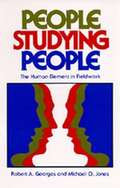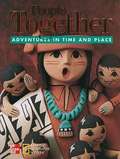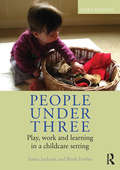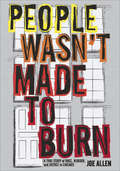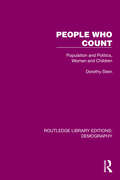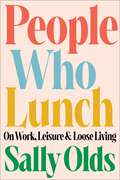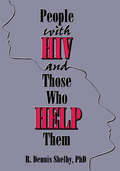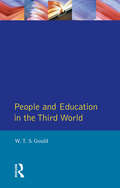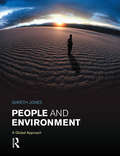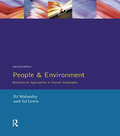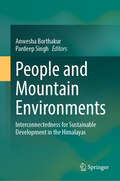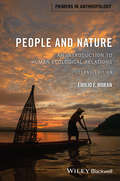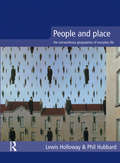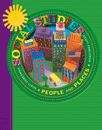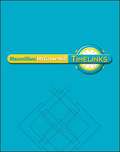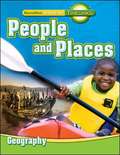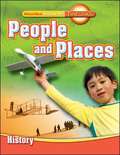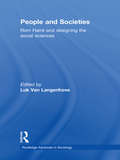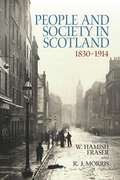- Table View
- List View
People Studying People
by Robert A. Georges Michael O. JonesThe authors of this book demonstrate that fieldwork is first and foremost a human pursuit. They draw upon published and unpublished accounts of fieldworkers' personal experiences to develop the thesis that an appreciation of fieldwork as a unique mode of inquiry depends upon an understanding of the role the human element plays in it. They analyze the processes involved when people study people firsthand, focusing upon the recurrent human problems that arise and must be solved. The human processes and problems, they argue, are common to all fieldwork, regardless of the disciplinary backgrounds or the specific interests of individual researchers.
People Together: Adventures in Time and Space
by James A. Banks Barry K. Beyer Gloria Contreras Jean Craven [et al.]A social studies book equipped with a handbook to guide the readers through the various ways on how to read and understand social studies.
People Under Three: Play, work and learning in a childcare setting
by Sonia Jackson Ruth ForbesServices for young children have gone through a period of rapid transformation in recent years, which have been paralleled by great advances in our knowledge of early child development. However, care and education in the first three years of life continues to be a neglected area. Thoroughly updated to take account of key policy and practice changes in childcare provision, this landmark text translates child development theory and research into everyday practice. All the practical ideas in the book have been developed and tested in nurseries, family and children’s centres and include the importance of providing opportunities for adventurous and exploratory play for babies and toddlers, understanding and responding to children's emotional needs and offering personalized and sensitive care. The book also explores different ways of working with parents and the role of early years settings and practitioners in helping to keep children safe. It includes chapters on: Childcare policy and services Planning spaces for living, learning and playing Babies in day care Heuristic play with objects Mealtimes Learning out of doors Leading and managing a childcare centre Involving and working with parents Safeguarding children People Under Three is an established practical text for all those training to work with young children or managing day care facilities. Focusing on the care and learning of very young children, it is designed specifically for those who look after them day by day, as well as being a useful resource for social work students and policy makers.
People Wasn't Made to Burn: A True Story of Housing, Race, and Murder in Chicago
by Joe AllenThis story of a grief-stricken man&’s murder of a landlord is &“nothing less than a reinvention of the true crime genre&” (The Nation). In 1947, James Hickman shot and killed the landlord he believed was responsible for a tragic fire that took the lives of four of his children on Chicago&’s West Side. But a vibrant defense campaign, exposing the working poverty and racism that led to his crime, helped win Hickman&’s freedom. With a true-crime writer&’s eye for suspense and a historian&’s depth of knowledge, Joe Allen unearths the compelling story of a campaign that stood up to Jim Crow well before the modern civil rights movement had even begun. Those who witnessed the Great Recession&’s deteriorating housing conditions and accelerating foreclosure crisis will discover a hauntingly similar set of circumstances contributing to the Hickman case—giving this little-remembered story profound relevance in today&’s political atmosphere and the tension surrounding rampant wealth and racial inequality. &“[A] remarkable book . . . a horrific portrait of the inhumane conditions in which blacks were forced to live in post-WWII Chicago.&” —Chicago Tribune
People Who Count: Population and Politics, Women and Children (Routledge Library Editions: Demography #12)
by Dorothy SteinOriginally published in 1995, this book confronts the contentious political issues on all sides of the population debate, including immigration, demographic competition, gender ratios, reproductive research and children’s rights. The book argues that lower fertility rates are preferred by women themselves; are beneficial in their own right to both women and children; and should not be used as a bargaining chip in any other area of the development debate. Drawing on a large body of research in anthropology, child psychology and population studies the book presents evidence that the poor do not necessarily have large families as form of financial security, or to put them to work; people without offspring are less lonely in old age; immigration and refugee controls in the Northern Hemisphere have been more driven by politics than rational calculation and human rights; social security does not require a large cohort of young workers. This book is a challenging contribution to the development debate. It presents a persuasive case for policies which recognise hopeful trends in relieving the environmental and social pressures of a globally increasing population.
People Who Lunch: On Work, Leisure, and Loose Living
by Sally OldsA riveting investigation of the utopian experiments attempting to resist the unrelenting demands of late-stage capitalism—only to end up living comfortably alongside it What do post‑work politics, the cult of crypto, clubbing, and polyamory have in common? All have spawned thriving subcultures united in their rejection of the patriarchal capitalist order: from wage labor, to the reign of the shareholder class over capital markets, to romantic relationships that feel like contractual arrangements to be negotiated, and more.People Who Lunch is about hating work and needing to work, intimacy and technology, labor and leisure, and the challenge of living our ideals in a less than ideal world. In it, Sally Olds brings her &“unsparing scrutiny to bear…as she grapples with the sense of entrapment in the machinery of capitalism and remorseless logic of commodification&” (ABC Arts). In one essay, Olds&’s brief flirtation with post-monogamy forces her to confront the emotional prison of the &“open relationship&”; in another, a multi-hour viewing of a critically acclaimed performance art piece highlights how even the highest forms of culture exist to convert pleasure into capital. In the end, her forays into these colorful worlds betray a deep irony: escaping a system built on the exchange of wage labor is, quite simply, a lot of work.
People Who Make a Difference (Weekly Explorer Magazine)
by McGraw-Hill EducationNIMAC-sourced textbook
People Who Make a Difference, [Grade 2]: Inquiry Journal
by William Deverell Kevin P. Colleary James BanksNIMAC-sourced textbook
People With HIV and Those Who Help Them: Challenges, Integration, Intervention
by Carlton Munson R Dennis ShelbyIn this guidebook, People With HIV and Those Who Help Them, author Dennis Shelby uses the reported experiences of HIV-positive men to chart the course of living with HIV. He offers a consistent clinical-theoretical framework that encompasses the vast range of clinical problems clinicians may encounter in their work with HIV-positive individuals across the span of infection.This book provides a detailed account of the many psychological transformations that infected people experience. People With HIV and Those Who Help Them enables clinicians and students to better address the problems commonly encountered in clinical practice with persons with HIV. Clinicians will be able to gain perspective on the process of knowing one is infected, infected men will see their process mirrored and validated, and family, friends, and partners of infected men will gain a greater appreciation for the experience of their relative, friend, and partner. As clinicians have gained experience in working with HIV-positive people, they have become increasingly aware of the complexity of successful clinical intervention with HIV-related problems. In his book, Shelby “breaks down” this complex process into its component aspects: psychological impact of HIV infection the process of adapting to the knowledge of infection the dynamic process involved with HIV infection common problems and solutions encountered by infected people case examples that illustrate the clinical framework intensive psychotherapy and HIV infectionThe study that is the basis for this book charts the initial psychological impact and many changes and transformations of the experience of being HIV-positive. While infected people are often encouraged to maintain hopeful outlooks and to think of themselves as living with HIV rather than dying from it, it is often a long and arduous process to achieve and maintain this perspective. People With HIV and Those Who Help Them is a guide to help those with HIV to keep a positive outlook on life.
People and Education in the Third World (Longman Development Studies)
by W. T. GouldFirst published in 1993. Routledge is an imprint of Taylor & Francis, an informa company.
People and Environment: A Global Approach
by Gareth JonesPeople and Physical Environment, A Global Approach provides an introduction to the main areas of environmental concern for geographers, environmental scientists and planners at the beginning of the twenty-first century. These include:Pollution of the atmosphere and its impact on our climate; The exploitation of the oceans; Management and supply of fresh water; Degradation of the land, and Biodiversity, and the need to maintain genetic diversity.The book argues that our knowledge and understanding of the environment is now so great that we can predict with considerable accuracy where the skills of science and technology need to be focussed in order to prevent severe environmental damage from occurring. Achieving successful management of the environment has become dependent upon active participation of a society prepared to pay for a high quality of life and the willingness of our elected politicians to legislate and enforce the very highest standards of environmental management. This book will be essential reading for students of geography, environmental studies/science and land use planners and will also contribute valuable information for climatology, biogeography, hydrology, land economy and forestry students.
People and Environment: Behavioural Approaches in Human Geography
by D. J. Walmsley G. J. LewisFirst published in 1994. Routledge is an imprint of Taylor & Francis, an informa company.
People and Mountain Environments: Interconnectedness for Sustainable Development in the Himalayas
by Pardeep Singh Anwesha BorthakurPeople living in the mountains maintain a unique relationship with their surrounding environment. Humans have settled in mountainous regions all across the globe for centuries, adapting to the challenging terrains and establishing exceptional cultural practices and lifestyles. Until today, they depend on their immediate ecosystems for their everyday necessities while also conserving those environments through their own traditional practices and belief systems. Understanding and addressing the ease and complexities of the relationship between people and mountains is essential for sustainable development through overall conservation and well-being of both the environment and the communities living in these regions. The mountain communities in the Himalayas and their interconnectedness with their surroundings could provide important insights in this regard. For instance, the interaction between humans and mountains in the Himalayas is diverse, spanning across various cultural, economic, political, environmental and recreational dimensions and parameters. As sustainable development is a core goal of the world today, it is both interesting and pertinent to explore these various aspects and locate possible learnings in the present-day global environmental scenario. Accordingly, this book is an attempt to situate the interconnected between people and the mountains in the Himalayan landscape towards tracing learnings for sustainable development. Our aim is to edit a holistic volume where aspects ranging from ecosystem services to cultural and spiritual significances of the mountains for the local communities and from contributions of the Himalayas in relation to water, agriculture and food practices to the challenges associated with haphazard infrastructural developments and environmental justice implications are adequately addressed. We acknowledge that balancing the human needs of the mountain communities while ensuring environmental conservation is a major challenge. Ecologically fragile and biodiversity rich the Himalayan region is no exception. Further, mountain communities in the Himalayas are facing tremendous challenges in adapting to changing climate conditions, such as altered precipitation patterns and increased frequency of extreme weather events. Unsustainable economic activities in the form of chaotic tourism practices and infrastructural developments among others add to the emerging challenges. Accordingly, it is important to put research efforts towards active sustainable development practices where human needs are met while minimizing undesirable impacts on the Himalayan mountain ecosystems. The Himalayas are critical for global ecological balance. Therefore, this book will not only be helpful for the countries situated in these mountain regions alone, but also will provide useful insights for environmental sustainability at a much larger global scale.
People and Nature: An Introduction to Human Ecological Relations (Primers in Anthropology #1)
by Emilio F. MoranNow updated and expanded, People and Nature is a lively, accessible introduction to environmental anthropology that focuses on the interactions between people, culture, and nature around the world. Written by a respected scholar in environmental anthropology with a multi-disciplinary focus that also draws from geography, ecology, and environmental studies Addresses new issues of importance, including climate change, population change, the rise of the slow food and farm-to-table movements, and consumer-driven shifts in sustainability Explains key theoretical issues in the field, as well as the most important research, at a level appropriate for readers coming to the topic for the first time Discusses the challenges in ensuring a livable future for generations to come and explores solutions for correcting the damage already done to the environment Offers a powerful, hopeful future vision for improved relations between humans and nature that embraces the idea of community needs rather than consumption wants, and the importance of building trust as a foundation for a sustainable future
People and Place: The Extraordinary Geographies of Everyday Life
by Phil Hubbard Lewis HollowayAn innovative introduction to Human Geography, exploring different ways of studying the relationships between people and place, and putting people at the centre of human geography. The book covers behavioural, humanistic and cultural traditions, showing how these can lead to a nuanced understanding of how we relate to our surroundings on a day-to-day basis. The authors also explore how human geography is currently influenced by 'postmodern' ideas stressing difference and diversity. While taking the importance of these different approaches seriously as ways of thinking about the role of place in peoples' everyday lives, the book also tries to encapsulate what has been so vibrant and exciting about human geography over the last couple of decades. By using examples to which students can relate - such as how they imagine and represent their home, the way they avoid certain spaces, how they move through retail spaces, where they choose to go to university, how they use the Internet, how they represent other nations and so on - the authors show how geography shapes everyday life in a manner that is seemingly mundane yet profoundly important.
People and Places
by Candy Dawson Boyd C. Frederick Risinger Geneva Gay Rita Geiger James B. Kracht Valerie Ooka Pang Sara Miranda SanchezA book which tells us that one should learn about community, neighborhood and history of your country.
People and Places Citizenship
by Dinah Zike James A. Banks Kevin P. Colleary Linda Greenow Walter C. Parker Emily M. Schell Irma M. Olmedo Raymond C. JonesMacmillian/McGraw-Hill TIMELINKS Grade 1 (or grade 2) builds geographic mastery with mapsand skills, offers reading skills and strategies to reinforce Reading/Language Arts skills,and integrates Dinah Zike's Foldables® to help students improve comprehension. * Five books: Citizenship, Culture, Economics, Geography, History * Available as single copies or in grade level sets
People and Places Economics
by Dinah Zike James A. Banks Kevin P. Colleary Linda Greenow Walter C. Parker Emily M. Schell Irma M. Olmedo Raymond C. JonesMacmillian/McGraw-Hill TIMELINKS Grade 1 (or grade 2) builds geographic mastery with mapsand skills, offers reading skills and strategies to reinforce Reading/Language Arts skills,and integrates Dinah Zike's Foldables® to help students improve comprehension. * Five books: Citizenship, Culture, Economics, Geography, History * Available as single copies or in grade level sets
People and Places Geography
by Dinah Zike James A. Banks Kevin P. Colleary Linda Greenow Walter C. Parker Emily M. Schell Irma M. Olmedo Raymond C. JonesMacmillian/McGraw-Hill TIMELINKS Grade 1 (or grade 2) builds geographic mastery with mapsand skills, offers reading skills and strategies to reinforce Reading/Language Arts skills,and integrates Dinah Zike's Foldables® to help students improve comprehension. * Five books: Citizenship, Culture, Economics, Geography, History * Available as single copies or in grade level sets
People and Places: History
by Dinah Zike James A. Banks Kevin P. Colleary Linda Greenow Walter C. Parker Emily M. Schell Irma M. Olmedo Raymond C. JonesMacmillian/McGraw-Hill TIMELINKS Grade 1 (or grade 2) builds geographic mastery with mapsand skills, offers reading skills and strategies to reinforce Reading/Language Arts skills,and integrates Dinah Zike's Foldables® to help students improve comprehension. * Five books: Citizenship, Culture, Economics, Geography, History * Available as single copies or in grade level sets
People and Societies: Rom Harré and Designing the Social Sciences (Routledge Advances in Sociology)
by Luk Van LangenhoveRom Harré has pushed the boundaries of our thinking about people and societies and has challenged the orthodox philosophy of science and social psychology. His countless books and articles have inspired generations of scholars in philosophy, psychology, linguistics, cognitive science and social theory. The diversity of his work makes that some see him as a leading figure in the critical realist school of philosophy of science, other as a key player in developing a social constructionist approach to psychology. The present volume brings together a careful selection of his key writings and presents them in a framework that stresses the evolution of his thinking as well as the place of his thinking in ongoing debates in different disciplines. The overall theme is the study of people and their ways of life. This is the first book that gives readers a systematic introduction in the conceptual universe of this towering figure.
People and Society in Scotland, 1830–1914
by W. Hamish FraserThis is the second volume of a three-volume study of Scottish social change and development from the eighteenth century to the present day, originally published by John Donald in association with the Economic and Social History Society of Scotland. The series covers the history of industrialisation and urbanisation in Scottish society and records many experiences which Scotland shared in common with other societies, looking at the impact of those changes throughout the spectrum of society from croft, bothy and hunting lodge to mines, foundries and urban poor houses. The series is intended to illustrate the identity and distinctiveness of Scotland through its separate institutions and through areas such as language, law and religion and recognises Scotland as a multi-cultured society, the highland and lowland cultures being only two among several.
People and Spaces in Roman Military Bases
by Penelope M. AllisonThis study uses artefact distribution analyses to investigate the activities that took place inside early Roman imperial military bases. Focusing especially on non-combat activities, it explores the lives of families and other support personnel who are widely assumed to have inhabited civilian settlements outside the fortification walls. Spatial analyses, in GIS-type environments, are used to develop fresh perspectives on the range of people who lived within the walls of these military establishments, the various industrial, commercial, domestic and leisure activities in which they and combat personnel were involved, and the socio-spatial organisation of these activities and these establishments. The book includes examples of both legionary fortresses and auxiliary forts from the German provinces to demonstrate that more material-cultural approaches to the artefact assemblages from these sites give greater insights into how these military communities operated and demonstrate the problems of ascribing functions to buildings without investigating the full material record.
